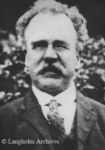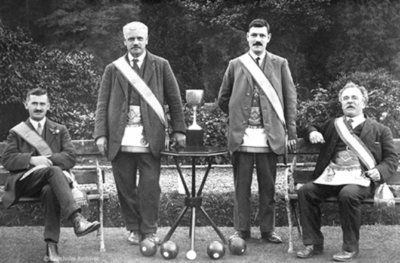Plumber, 81 High Street
Robert Ramage caused considerable controversy in 1915 by proposing a motion to cancel the traditional Common Riding event in its entirety, which was initially adopted but later overturned.

He was criticised by opponents for his participation in other local festivities such as a large tea party at the Old Town Bowling Club (which he promoted, as the new president, and at which he gave a speech,) and a wild west show visiting Langholm with a huge tent with a capacity of 10,000 people. Unlike most other Langholm sports clubs, the Old Town Bowling Club continued playing tournaments with other clubs during the war.
In the midst of the controversy, his son William was killed in the Dardanelles, serving as a platoon sergeant with 1st/5th KOSB.
Robert was a dedicated freemason, seen on the right below as part of the winning team in the 1920 Dumfriesshire masonic bowling tournament.

Left to right: J Ewart, J Connon, W Murray, R Ramage
As incoming president, he suggested that the club should adopt the practice of some other clubs of having lady members, which was implemented.
Robert was also on the Langholm School Board.
After the death of Robert’s son, Lieutenant James McGeorge of Langholm, 1st/5th KOSB, wrote:
Monday, 21st June, 1916
Dear Mr Ramage,
It is with deep regret that I have to inform you of the death of your son, Willie, at 6.30 this morning.
My platoon and another were occupying slightly advanced trenches overnight, and we were returning to our own trench by way of a communication trench in single file, when a stray piece of shrapnel hit him in the head. I was close behind him at the time. The medical officer informs me that death must have been instantaneous and painless. He was buried this morning in presence of his brother and myself and George Cowan has made and erected at his grave a cross bearing the inscription: “To the memory of Sergt. W. Ramage. 5th K.O.S.B., killed June 21. 1915. R.I.P.” The Brigade Chaplain conducted a service at the graveside. The whole Company is downcast over his death. as he was well liked by all and was without s single enemy. I consider this to be a very fine testimonial to his character, as one in his position exercising authority over men who have not been accustomed to strict discipline before mobilisation, is very apt to make one or two enemies, but I can vouch for it that this was not so in his case. Personally, I am very grieved as his loss, as through it I have lost not only an excellent platoon sergeant, but also a good friend. I am very sorry for John who is bearing up. Please convey to Mrs Ramage and family the sincere sympathy of myself and all officers and men of B Company.
Yours sincerely,
J. McGeorge, Lieut.
P.S.-The Colonel and Major Miller attended the funeral.
Major Miller wrote:
Dear Mr Ramage,
Permit me to add my expression of sorrow at the loss of your son Sergt. Ramage. He was a fine young fellow, and did his duty manfully. I grieve with my comrades at his loss, and with them join in sympathy to you and yours.
Believe me, yours sincerely,
Will. J. Miller, Major
The E&L commented:
Sergt. Ramage who was only 24 years of age, has been associated with his father in business for several years now, and throughout the town he was universally liked and respected, his genial disposition making for him very many friends. of As this is the first casualty among the Langholm Territorials in the war it has naturally created a deep impression on the minds of the people of Langholm, and many expressions of sympathy have been extended to Mr and Mrs Ramage and their family in their loss.
The E&L added a pulpit reference made by Rev George Orr at the close of the morning service in the North UF Church on Sunday 11th July:
Sergeant Ramage was killed at the Dardanelles about 6 o’clock on Monday morning, the 21st of Jane. His company, having done its turn of duty in the firing line, was returning through a communication trench in single file, he leading, when a piece of shrapnel struck and killed him. As was the case with Elijah, the great change came to him as he walked. He was buried about three hours afterwards, and the gathering at the grave was composed of the Chaplain who conducted the service, the Colonel of the Regiment, Captain Clark-Kennedy, Lieut. McGeorge, together with Private John Ramage, grieving sorely for his beloved brother, and Privates George Cowan, Robert Bell, and Thomas Davidson. Sergeant Thomas Morrison and Private George Cowan, friends of the dead soldier, and skilled in the handicraft of wood, made and erected a cross, shaped with loving care, and bearing the inscription,
To the memory of Sergeant W. Ramage,
5th K.0.5.B.
Killed 21st June, 1915,
R.I.P.It melts the heart to picture these dear Laugholm lads, and especially his brother John, standing sadly round the grave of the first to fall of the Langholm Territorials.
But neither they, nor we, should sorrow over-much. The character of William Ramage is known to us all. As a congregation we saw every week, for years, his exceeding faithfulness and helpfulness in the church choir. All who had the slightest acquaintance with him knew him to be a most kindly, even tempered, four-square, well-principled, sterling man. His friends and fellow-soldiers were well aware, by experience, of his obligingness and thoughtfulness, the unselfishness and loyalty of his attachments, and that a truer comrade they never had and never can expect. So he was popular as a sergeant; his officers respected him, and his men would do anything for him. Above all, his brother writes, “His Testament and other things I will send as soon as possible. I feel confident he was prepared for the Hereafter, as, during the last fortnight, life and death have been brought nearer to us all than ever was the case before.”
There is only one place where the soul of such man can be. Like Elijah, he has been caught up in a chariot of fire, but, like him, also, it has been to Heaven: “and it came to pass as they still went on, and talked, that, behold, there appeared a chariot of fire, and horses of fire, and parted them both asunder, and Elijah went up by a whirlwind to Heaven.” His lamp has been early quenched, yet it shines. There are men who will be better men for the manliness of Willie Ramage, the first of the Langholm Territorials to give his life for his country, and the Kingdom of Christ bound up with it. May his father and mother, and the family, thank God for a good, heroic son, and the sacred grandeur of his end. We feel for them deeply, and pray that their faith may be their staff of comfort, and that they may be enabled to arise from the ashes of their grief clothed with the garment of praise and anointed with the oil of joy. When Mr Gladstone was told of the death of his eldest son, Willie, he bowed his head, put his hand before his eyes, and remained some moments in silent prayer, then he lifted up his eyes, and said in a strong voice, “We shall meet again.” That is the Christian certainty. May it burn brightly in the breasts of all the bereaved.
E&L, 14 Jul 1915
| Born | Glasgow, 1854 |
| Parents | William Ramage, bell hanger (1821-), Elizabeth Polson (1821-) |
| Siblings | Youngest of three brothers and a sister |
| Marriage | Nicolas Bell (1854-1927) |
| Children | Anne (1886-1960), William (1891-1915), John (1894-) |
| Died | Costorphine, Edinburgh, 1933, aged 79 |